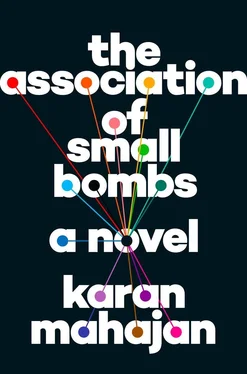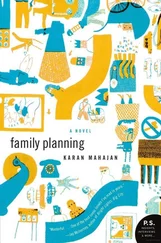“I see, I see,” Sharif said, smiling. Then he began to describe the job. Midway through, he stopped. “You should go home, beta. You seem very sick. This is a formality anyway. The job is yours if you want it.”
“Thank you, uncle.”
“Don’t thank. Any friend of my son is a friend of mine.” Then he said, “It’s up to you to raise your family name.” He said it cheerfully.
Ayub, his heart crinkling like a tissue, nodded desperately and went out.
________
His heart was thundering; it wouldn’t stop. Forget it, he told himself. There’s no way to fight it off. Accept this excess energy. He took a bus back to his room and spent the last scraps of the afternoon masturbating, crying, moaning, alternatively hot and cold, joyful and ready and alone and sick. Then it was time. He went to the designated shop in Paharganj, picked up the backpack with the bomb, and took an auto to Sarojini Nagar. The bomb was made of ammonium nitrate and charcoal tied with a thread — it was shaped like a coconut. A mobile phone was attached to a mass of materials and covered up with a gauzy cloth, so that if someone were to open his backpack, it would look like he was carrying a coconut for a ceremony.
An odd calm overcame him — the calm of living in cinematic time. He had spent the past few weeks using up his drama and tension — he saw the point of being sent early and remembered too what Rafiq had said about Shockie’s emotional behavior, how it drained him so he could focus coldly on action.
Sarojini Nagar is a horrible market in a nice part of South Delhi — an area characterized, in general, by wide roads, stately flyovers, government and private houses spaced decently apart, and well-demarcated lanes and street signs. He passed through the colonies the way a helpless person may topple down a waterfall, drawn along but also happy about every beautiful sight he encounters as he discovers he is not dying after all. With the evening had come an iota of relief and cool and he didn’t even mind the traffic or the slightly circuitous route the plump auto guy — wearing a thousand old rakhis on his wrist, rakhis like a fungus or infection — took to bump up his meter. It’s already happened, he told himself. It’s long over. When I get to the market, I’ll discover it’s on fire and it’ll be as if I wasn’t even present for what I did.
He had a sense, suddenly, of why Mansoor might have walked away from the blast without understanding or comprehending why. He hadn’t even set off his blast and time was compressing and skipping beats. He sucked on a Vicks; his throat flooded with cold.
When he paid the auto driver, he savored the texture of the notes, how difficult it was to uncurl them, how each one was crumpled in an individual way, how some had turned as soft as cloth from overuse. And that old-money smell — the smell of old keys.
The auto dropped him off at the mouth of the bazaar — near the square where the pukka market was based. He smelled ripe fruit. Elbowing rude unaware people, people passing quickly, people energized with purpose and conversation, pulling up their sleeves and smiling at the setting sun the way one may pose for a large camera, he went in deeper, into the warren, into this aquarium of fake brands. On either side, in a long row, shops churned with shoppers and shopkeepers, curling branches of incense, shiny baskets on sale for Diwali. A woman called her son close after he wandered off to a shop. A fat man stood talking loudly on his mobile, his hand pleasurably plucking the worry lines on his forehead and closing over his face like a crab, his eyes shut in happy concentration, his mouth open, his tongue moving about inside as mysterious roars came out. “Arre, bhai. No. No. No.” He kept shaking his head. It was the most joyful no Ayub had ever heard in his life. Another man sat on a bench, crouching over, washing his hands with water from a used plastic bottle, its brand sticker torn off, leaving behind a patchy residue, the ribs of the bottle pressed and distended. The man had alert eyebrows and curly hair with streaks of baldness — something was wrong with his hair; he was too young to be balding — and as Ayub looked at him, he looked back and a question passed between them and Ayub kept going, conscious of being watched. He could imagine the man’s head turning toward him, taking in his backpack. For that reason he went off for as long as he could. When he turned, the man was gone.
These looks were exchanged daily between men of a certain class. They said: I know you. I wonder how you made it.
There had been a moment — when he had seen the woman and the child — that he’d lost focus, become a shopper himself, but now he was worked up to full alertness. Standing before a shop, he took the bag off his back and held it at his side as if freeing himself to gaze.
The people in the shop did not notice him. The bespectacled owner, sitting behind a desk, was shouting at one of his assistants. The assistant was jammed halfway up a wall of clothes, his feet bare and his hands plunged into the layers of plastic. Ayub put the bag down on the road, turned, and walked.
A few seconds later, the bomb opened with a seismic roar.
Hundreds of people lay on the ground. From the shop came only silence. Ayub — thrown to the ground, rolling, sliding — thought: Tara will hear me now.
THE ASSOCIATION OF SMALL BOMBSOCTOBER 2003–
When Vikas saw news of the bombing on TV, he called his wife to come over and watch. Deepa, who had been reading the paper in the drawing room, creased it into a tight square.
“How many dead?” she asked, peering into the cabin of the bedroom and then sitting on the edge of the bed and adjusting her spectacles.
The Khuranas, in the past few years, had started taking a morbid interest in blasts in all parts of the country, especially Delhi — they were excited by these bombings in a way that only victims of esoteric, infrequent tragedies are motivated by horrors. They knew instinctively what the victims and families would go through: how the government would promise help but the Municipal Corporation of Delhi would harass the shopkeepers, advising them to lower their estimated losses; how compensation would be announced in the papers, never to be paid out; and how the injured and dying would linger for hours in the market and the hospital before being treated.
“Are they saying who did it?” Deepa asked.
“No one’s taken credit for it. The news came in only ten minutes ago. It’s too bad. Sarojini Nagar is such a crowded market, especially at Diwali, and there aren’t any solid structures to absorb the blast.”
“They know this risk exists,” Deepa said, scowling a little. “Why they don’t improve security, I don’t know.”
“In this kind of market, how can you have security? I’m sure the shopkeepers would be against it.”
Vikas, especially, had turned himself into a student of terror. He had come to see that people were blind to tragedy till they experienced it firsthand, and that they were willing to risk the unknown if it meant they could make money in the interim. This was the case not just with small Indian markets, with their reluctance to secure themselves, but with the U.S. as well: Airlines had known for years about the danger of hijackings, but had lobbied against security because it cost time and money to process passengers. Better to let a plane be occasionally hurled off track, the heads of the airlines reasoned, than to hemorrhage money in the terminals.
It didn’t occur to them that a hijacker might wish to plough a plane back into the country, invest the blown and fluted metal into the mineral-rich earth.
Читать дальше












